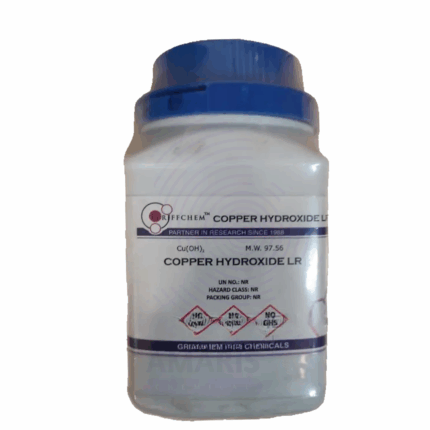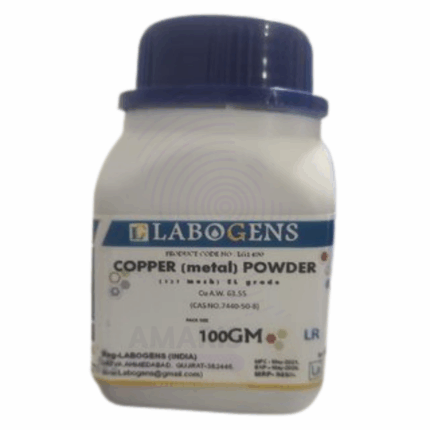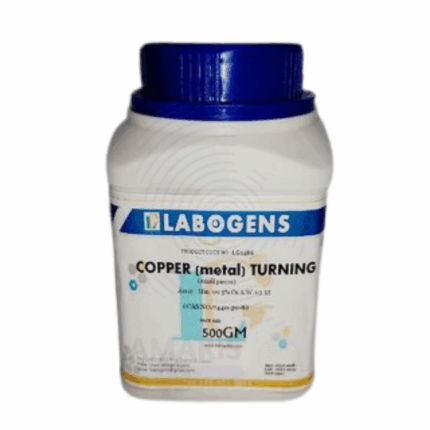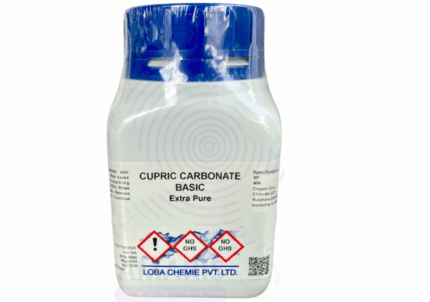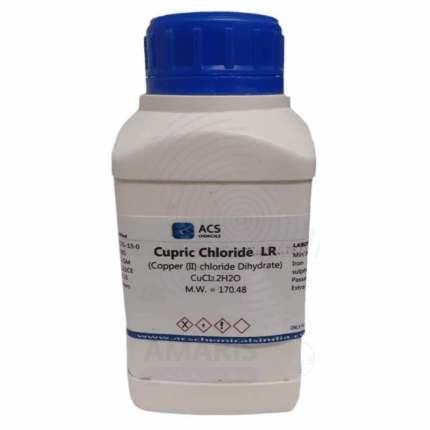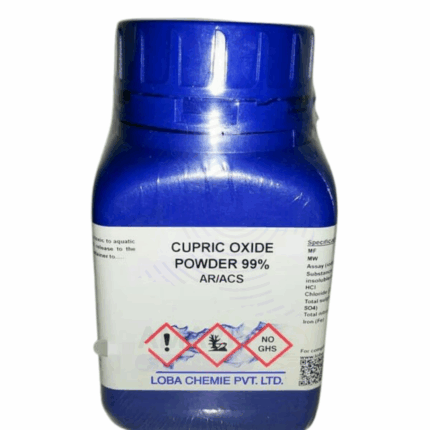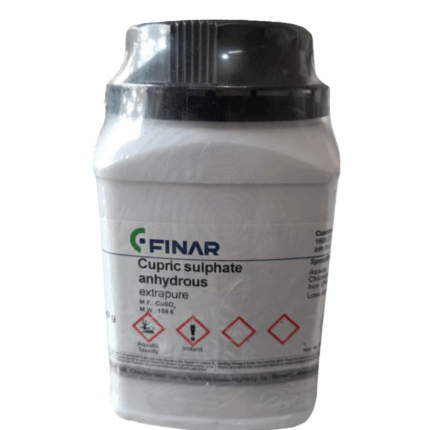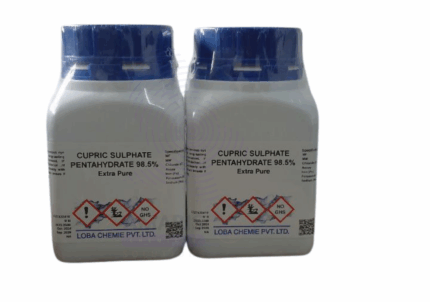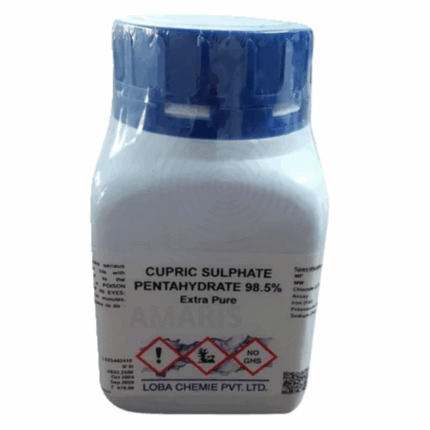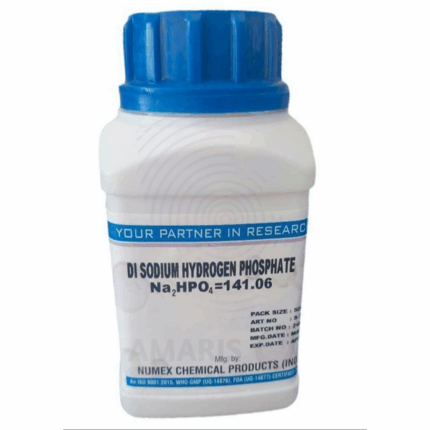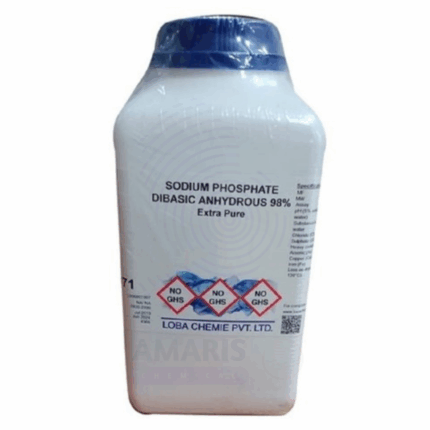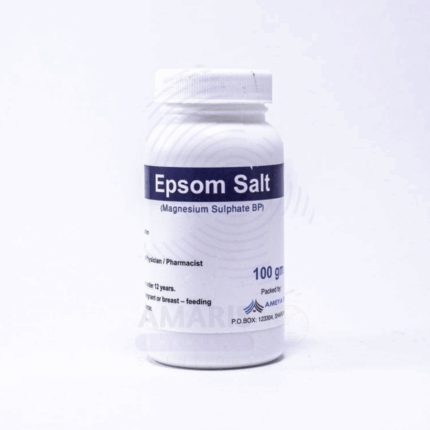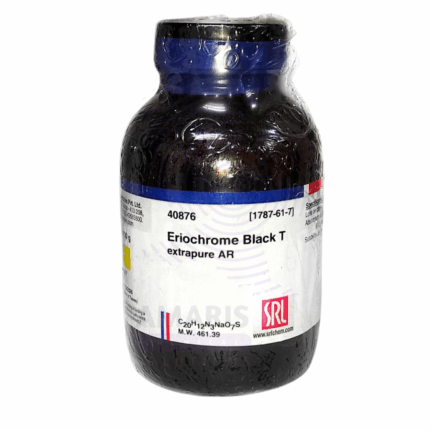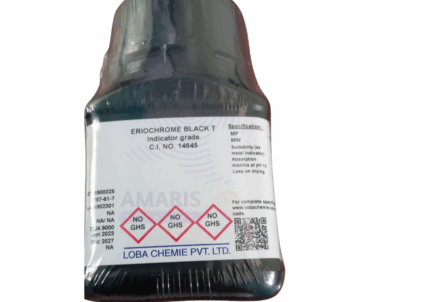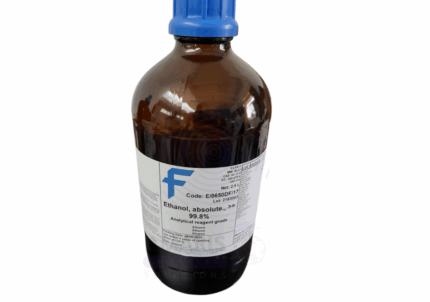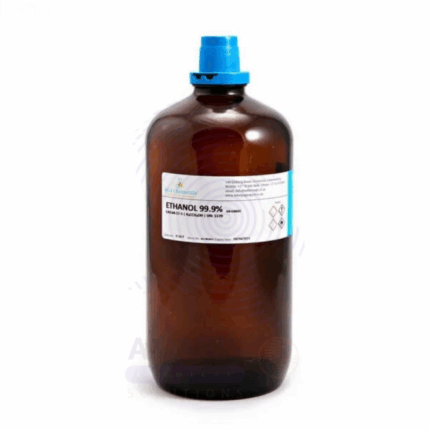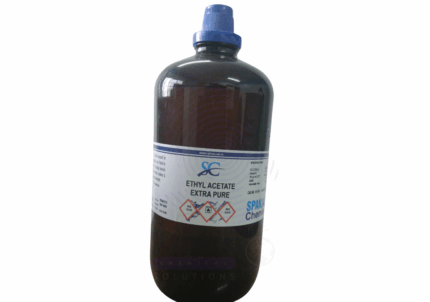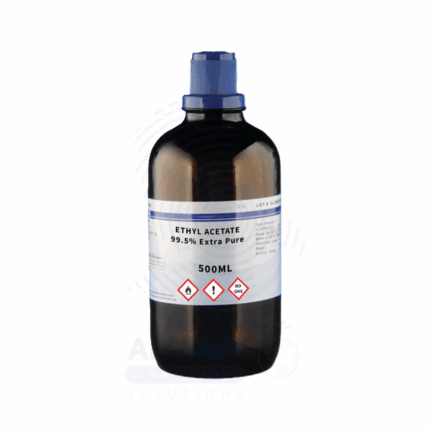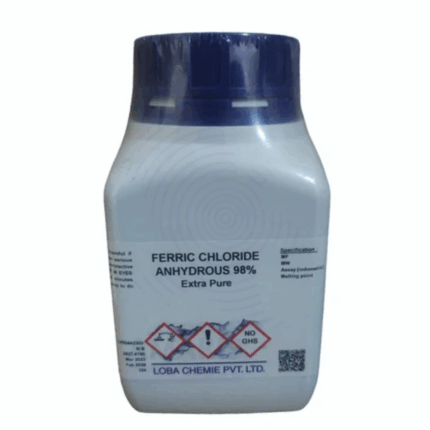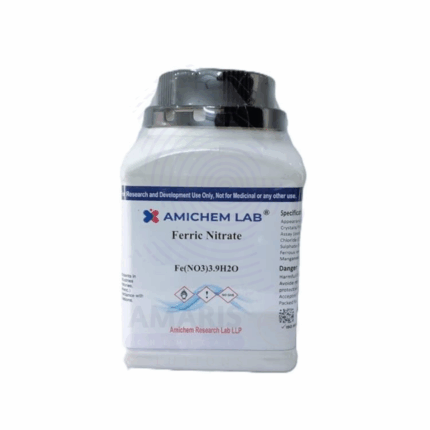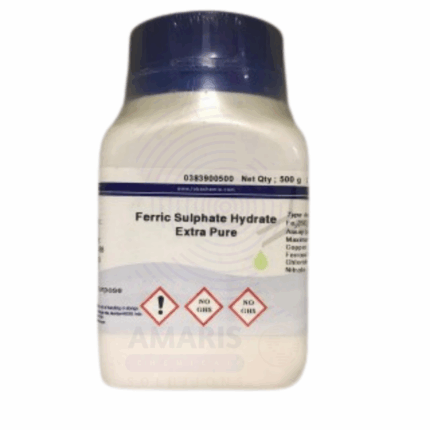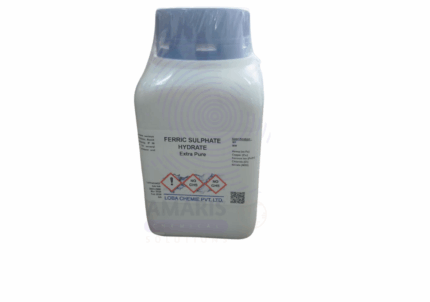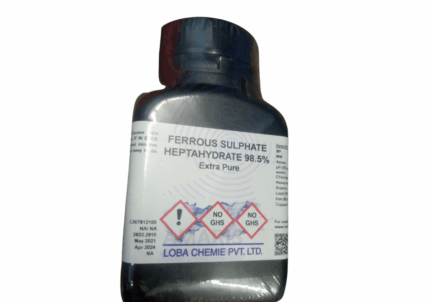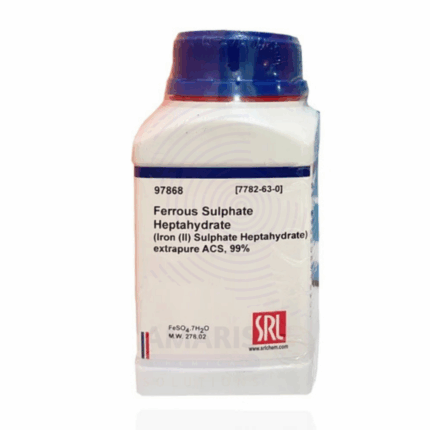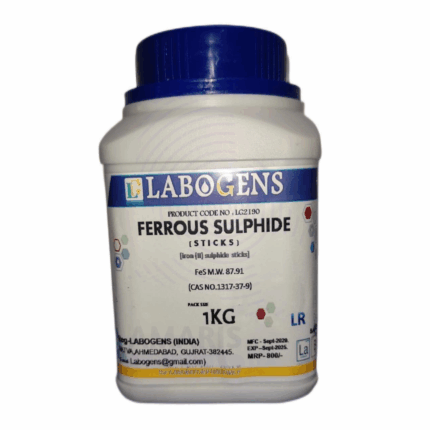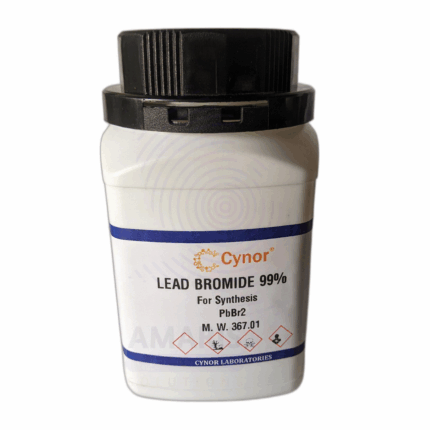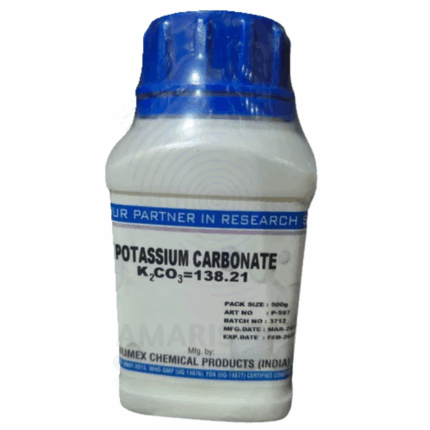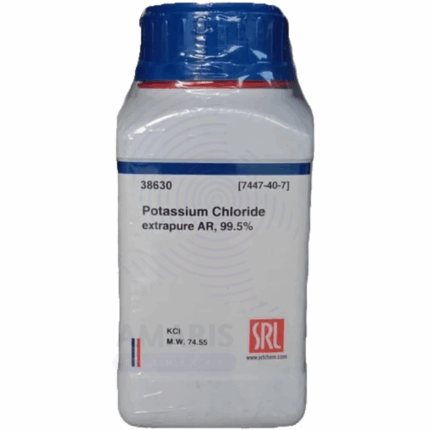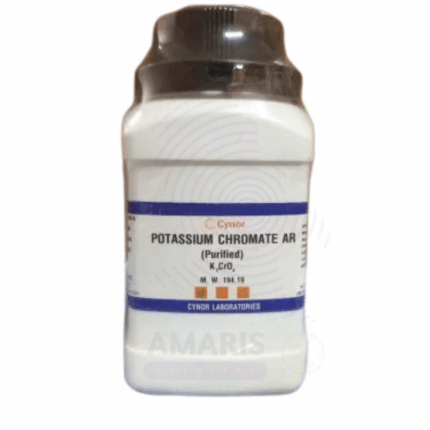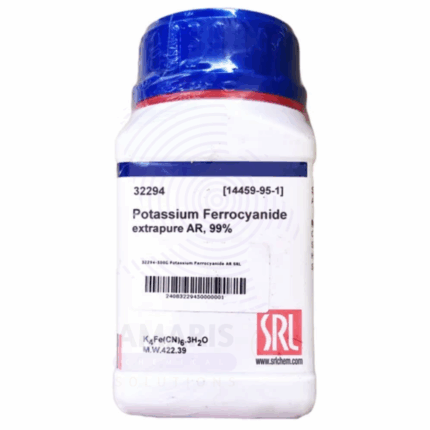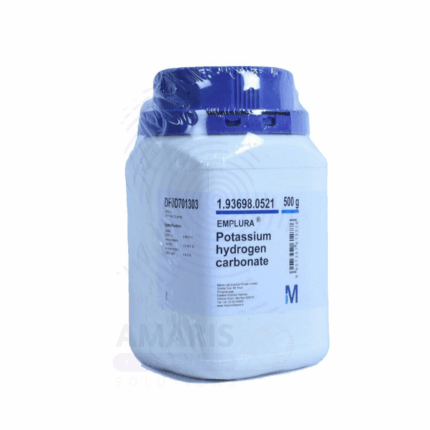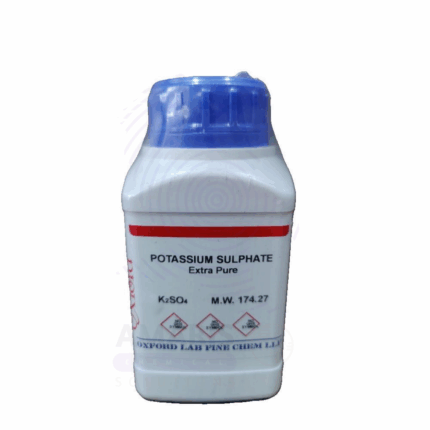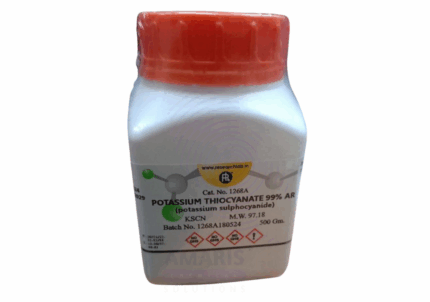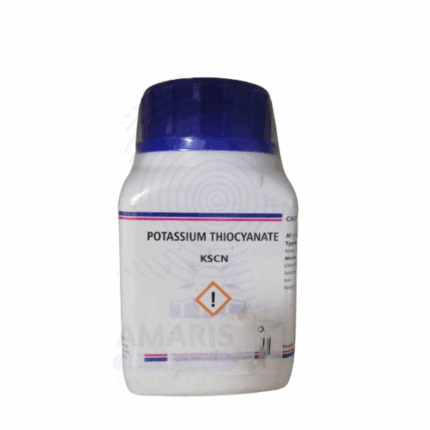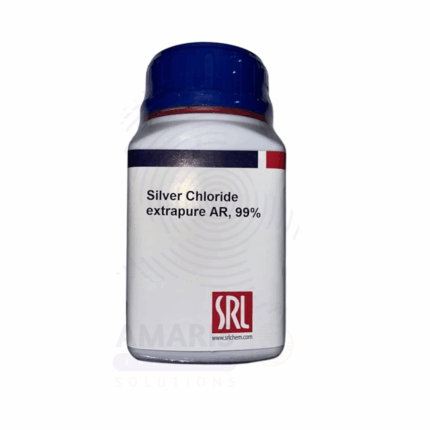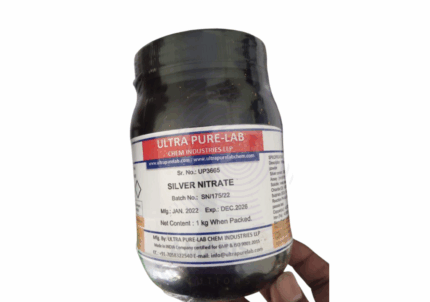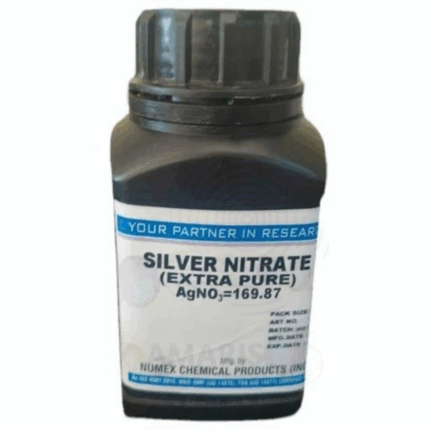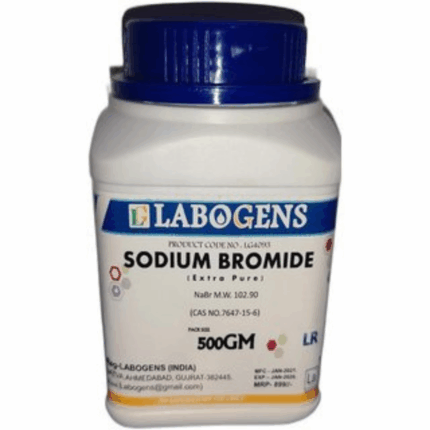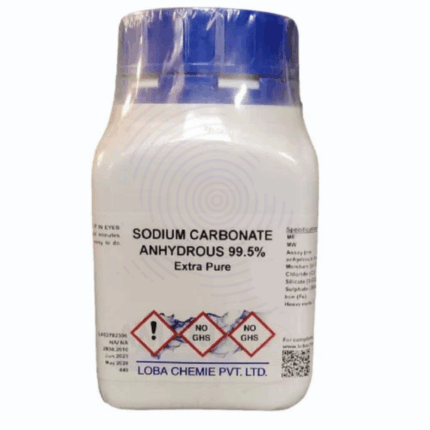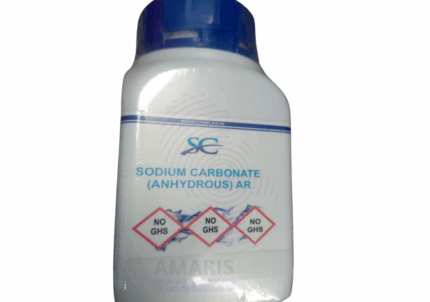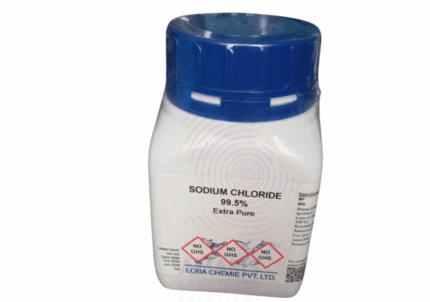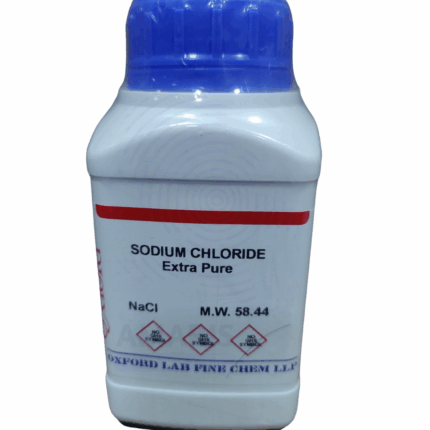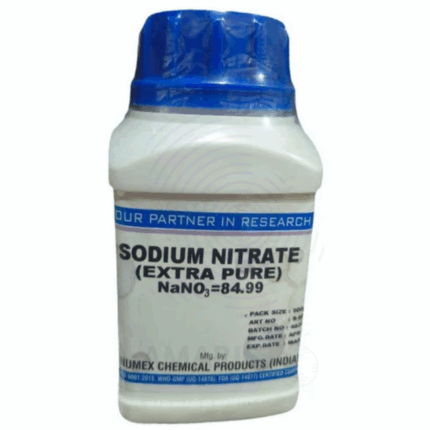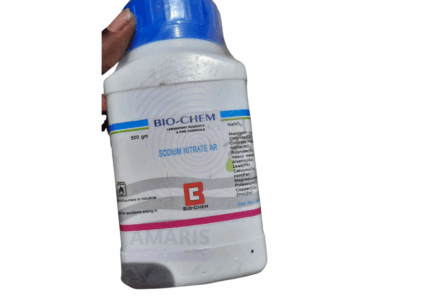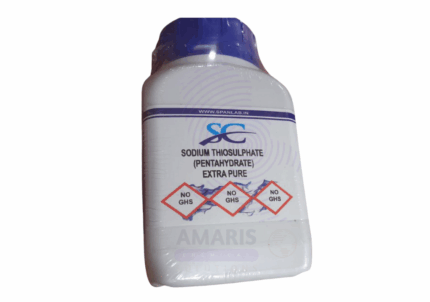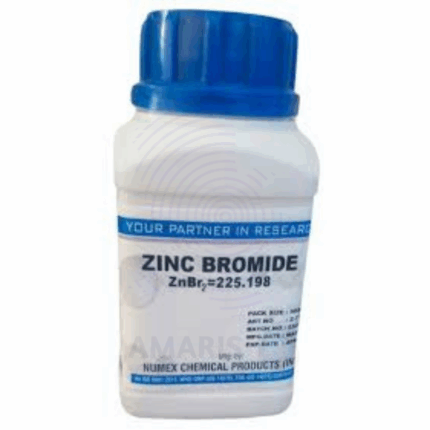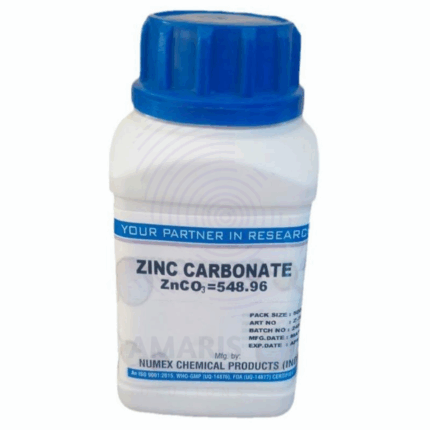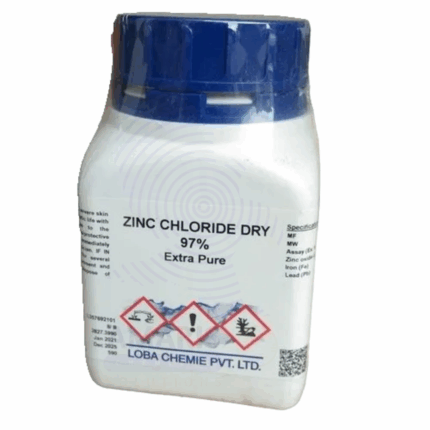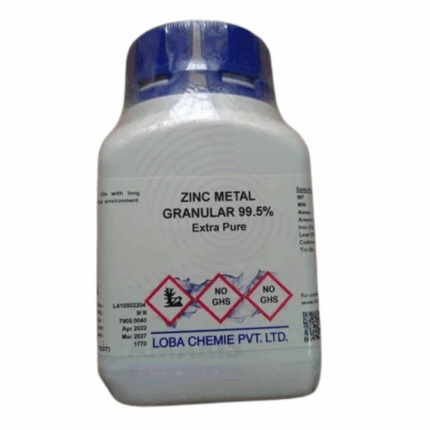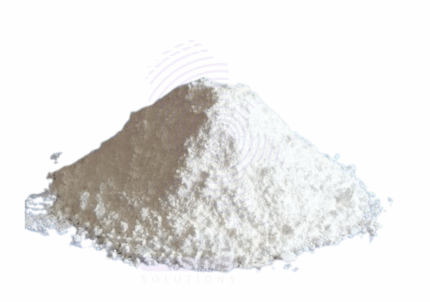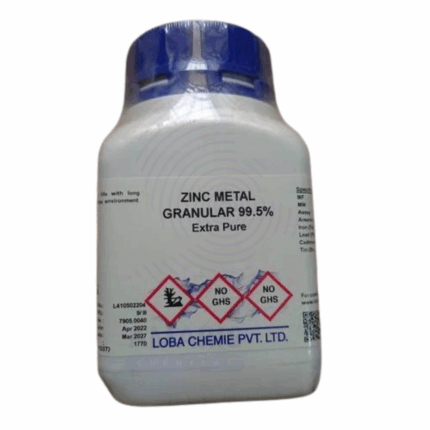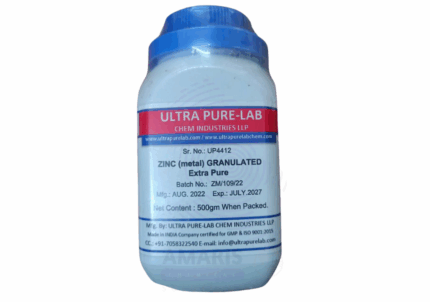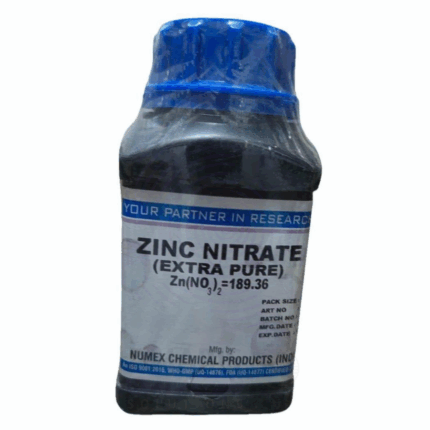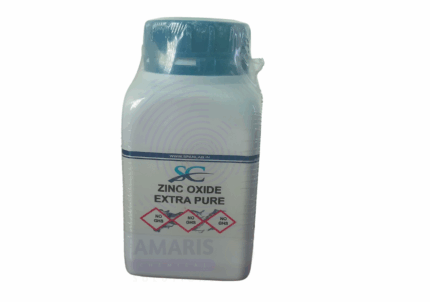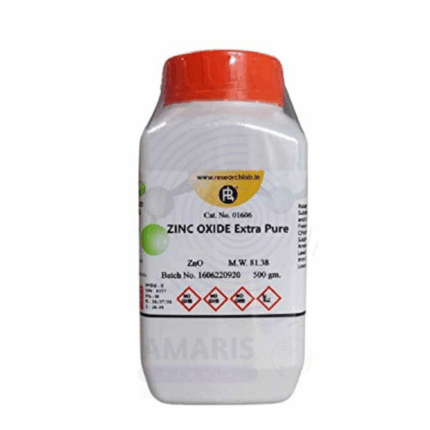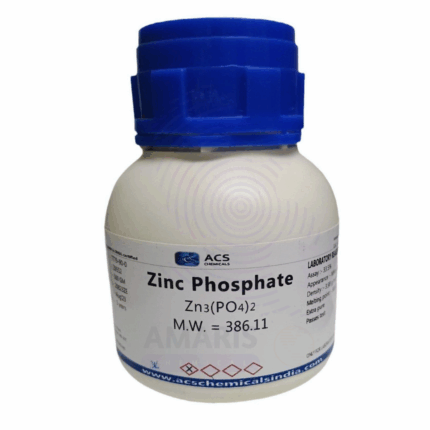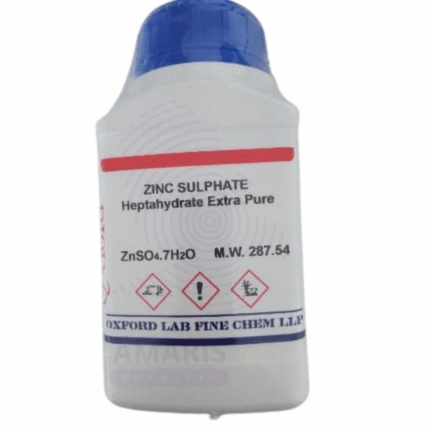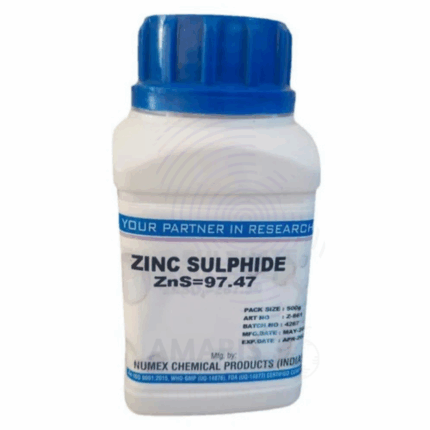
Cupric Carbonate Extra Pure
Cupric Carbonate Extra Pure is a fine, green, high-purity compound used in laboratories for inorganic synthesis, analytical chemistry, and educational demonstrations. It serves as a reliable source of copper ions in reactions and decomposes upon heating to form copper oxide, making it useful for studying thermal decomposition. In qualitative analysis, it is employed to observe characteristic reactions of copper salts. Its extra pure grade ensures minimal interference from impurities, supporting accurate experimental outcomes. Cupric carbonate should be handled in a dry environment and stored in tightly sealed containers to prevent degradation and maintain stability.
Cupric Chloride Extra Pure
Cupric Chloride Extra Pure is a green to yellowish crystalline compound widely used in laboratories as a catalyst, reagent, and source of copper ions in various chemical reactions. It plays a key role in organic synthesis, photochemical processes, and analytical chemistry procedures, especially for detecting reducing agents and halide ions. Its high solubility in water and alcohol allows for versatile application across wet-lab experiments. The extra pure grade ensures excellent reliability and minimal impurities, making it ideal for precision work in research and education. Store in a cool, dry place, protected from moisture and light to preserve its reactivity.
Cupric Oxide Extra Pure
Cupric Oxide Extra Pure is a black, fine powder extensively used in laboratory settings as a stable, high-purity source of copper in oxidation state +2. It is commonly applied in organic synthesis, inorganic reactions, and thermal decomposition studies, as well as in qualitative and quantitative analysis of copper. Its thermal stability also makes it suitable for ceramic glazing and as a precursor in catalyst preparation. This extra pure grade ensures low impurity levels, essential for accurate experimental results and reproducible data in both educational and research laboratories. It should be stored in a tightly sealed container away from moisture and strong acids.
Cupric Sulphate Pentahydrate Extra Pure
Cupric Sulphate Pentahydrate Extra Pure is a vibrant blue crystalline compound widely used in laboratories for its high solubility and consistent copper ion content. It is essential in analytical chemistry for Fehling's and Benedict’s solutions, in electrochemistry for plating and battery experiments, and as a biological nutrient in microbiological media. The pentahydrate form offers ease of handling and precise formulation in aqueous solutions. This extra pure grade ensures exceptional purity, making it suitable for teaching labs, research applications, and controlled experimental procedures. Store in a sealed container away from heat and moisture to maintain its crystalline integrity.
Disodium Hydrogen Phosphate Extra Pure
Disodium Hydrogen Phosphate Extra Pure is a high-purity, anhydrous inorganic salt widely used in laboratory settings as a buffering agent, pH regulator, and reagent in chemical analysis. It plays a crucial role in preparing phosphate buffer systems for biochemical assays, molecular biology protocols, and microbial culture media. With its reliable solubility and consistent reactivity, it supports accurate calibration of pH in solutions. Its extra pure grade ensures minimal contamination, making it ideal for use in sensitive analytical and research environments. Proper storage in airtight containers is recommended to prevent moisture absorption and preserve its effectiveness.
Disodium Phosphate Extra Pure
Disodium Phosphate Extra Pure is a high-grade inorganic compound commonly used in laboratories as a buffering agent, emulsifier, and reagent. It is particularly valuable in preparing phosphate buffer solutions for biochemical and molecular biology applications. Its reliable pH-stabilizing properties make it ideal for use in analytical chemistry, food analysis, and preparation of reagent mixtures. With excellent solubility in water and minimal impurities, this extra pure form ensures accuracy and consistency in experimental results across a wide range of laboratory procedures.
Epsom Salts Magnesium Sulphate Extra Pure
Epsom Salts Magnesium Sulphate Extra Pure is a high-purity, crystalline compound widely used in laboratory settings as a source of magnesium ions and as a drying or stabilizing agent in various chemical reactions. It is particularly valuable in analytical chemistry, buffer preparation, and qualitative tests involving sulfate or magnesium detection. In biological and biochemical research, it is often used to prepare nutrient solutions and culture media. The extra pure grade ensures minimal contaminants, making it suitable for precision applications and sensitive experiments. It should be stored in a cool, dry place to maintain its crystalline structure and prevent moisture absorption.
Eriochrome Extra Pure
Eriochrome Extra Pure—typically referring to Eriochrome Black T—is a complexometric indicator primarily used in EDTA titrations to detect metal ions, especially calcium (Ca²⁺) and magnesium (Mg²⁺) in water hardness analysis. In its extra pure grade, this dye ensures sharp, precise endpoint detection by minimizing impurities that could cause background coloration or interferences in spectrophotometric or volumetric determinations. It functions by forming a wine-red complex with metal ions, which turns blue when the metal is sequestered by EDTA. Suitable for high-precision analytical chemistry, it should be stored away from light and moisture to preserve stability.
Ethanol Extra pure
Ethanol Extra pure Extra Pure is a highly purified grade of ethyl alcohol widely used in laboratory, pharmaceutical, cosmetic, and analytical applications. At 99.8% purity, it contains minimal water, making it ideal for dehydration reactions, chromatography, spectroscopy, and cleanroom procedures. It serves as a universal solvent, disinfectant, and intermediate in chemical synthesis. This extra pure grade ensures low impurity levels, making it suitable for precision scientific experiments and pharmaceutical formulations. It is volatile and flammable, so it should be stored tightly sealed, in a cool, well-ventilated area, away from ignition sources.
Ethyl Acetate Extra Pure
Ethyl Acetate Extra Pure is a high-purity solvent widely used in analytical laboratories, chromatography, and sample preparation due to its fast evaporation and low toxicity. In laboratory settings, it’s valued for extraction, purification, and reaction medium roles, especially in organic synthesis. Its low water content and consistent purity make it suitable for GC/HPLC applications, adhesive formulations, and residue analysis. It must be handled in well-ventilated areas, away from heat or flame, and stored in tightly sealed containers to maintain its stability and prevent contamination.
Ferric Chloride Anhydrous Extra Pure
Ferric Chloride Anhydrous Extra Pure is a highly refined, moisture-free compound composed of iron and chlorine (FeCl₃). In laboratory settings, it is widely used as a reagent for detecting phenols and as an etching agent for metals, especially in printed circuit board (PCB) production. Its strong oxidizing properties also make it suitable for redox reactions, qualitative analysis, and inorganic synthesis. This extra pure grade ensures minimal impurities, making it ideal for precise and controlled chemical experiments.
Ferric Nitrate Extra Pure
Ferric Nitrate Extra Pure is a high-purity iron(III) salt (Fe(NO₃)₃) commonly used in analytical chemistry, inorganic synthesis, and qualitative analysis. In the lab, it serves as an oxidizing agent and a source of ferric ions in solution. It’s also employed in the preparation of coordination compounds, as a catalyst, and in various colorimetric tests. Its extra pure grade ensures low levels of contaminants, making it suitable for precision laboratory applications.
Ferric Sulphate Extra Pure
Ferric Sulphate Extra Pure is a high-grade iron(III) sulfate compound (Fe₂(SO₄)₃) widely used in laboratory settings for analytical and research purposes. It functions as an oxidizing agent and is employed in water analysis, pigment preparation, and chemical synthesis. Its high purity makes it ideal for experiments requiring minimal interference from impurities.
Ferrous Sulphate heptahydrate Extra Pure
Ferrous Sulphate heptahydrate Extra Pure is a high-purity laboratory-grade chemical commonly used as a reliable source of ferrous ions (Fe²⁺) in analytical chemistry and educational experiments. With its vivid blue-green crystalline appearance, this compound plays a crucial role in redox reactions, qualitative analysis, and titration procedures. It is frequently utilized in the preparation of iron standards, as a reducing agent, and in experiments that demonstrate oxidation-reduction principles. Due to its high level of purity, it is well-suited for controlled laboratory environments where consistent and accurate results are essential. Proper storage in a cool, dry place is recommended, as the compound is prone to oxidation and moisture sensitivity.
Ferrous Sulphide Extra Pure
Ferrous Sulphide Extra Pure is a high-purity, dark grey to black solid compound primarily used in laboratory demonstrations, especially for generating hydrogen sulphide (H₂S) gas when reacted with dilute acids. This reaction is a classic example in inorganic chemistry for studying gas evolution and the properties of sulfide compounds. Beyond educational uses, ferrous sulphide is also employed in analytical testing and in certain metallurgical and industrial processes where controlled sulfur introduction is required. Its high purity ensures minimal interference from impurities, making it ideal for precise scientific applications. The compound should be handled in a well-ventilated area and stored in tightly sealed containers to avoid moisture exposure and the release of toxic gases.
Potassium Chloride Extra Pure
Potassium Chloride Extra Pure is a high-purity, crystalline inorganic salt with the chemical formula KCl. It appears as a white, odorless, and highly soluble solid, widely used across laboratory, medical, and industrial applications due to its chemical stability and essential role in biological systems.
In laboratory settings, it serves as a reagent in buffer solutions, electrolyte standards, and ionic strength adjustment. In biochemistry, it’s frequently used to prepare isotonic solutions and simulate intracellular fluid composition. Its high purity ensures accuracy in molecular biology, analytical chemistry, and instrument calibration.
Industrially, Potassium Chloride is vital in fertilizer production (as potash), water softening systems, and food processing (as a sodium-free salt alternative).
Potassium Chromate Extra Pure
Potassium Chromate Extra Pure is a high-purity, bright yellow crystalline compound known for its reliability in precise laboratory analyses. It is commonly used as an indicator in argentometric titrations, particularly for the detection of chloride ions in solution. Its strong oxidizing nature also makes it valuable in various industrial processes, including metal passivation, pigment manufacturing, and dyeing applications. In educational and research laboratories, it serves as a dependable reagent for redox reactions and chemical demonstrations. Given its toxicity and environmental hazards, it should be stored securely and handled using proper protective equipment to ensure safety and compliance with regulatory standards.
Potassium Hydrogen Carbonate Extra Pure
Potassium Hydrogen Carbonate Extra Pure, also known as potassium bicarbonate, is a fine white crystalline powder with excellent purity and stability. It is commonly used in laboratories as a buffering agent due to its mild alkalinity. In food processing, it functions as a leavening agent and pH regulator, and in agriculture, it is applied as a fungicide and a source of potassium. Its high solubility in water and non-toxic nature make it a versatile and safe compound for a range of analytical and technical applications. Proper storage in tightly sealed containers, away from moisture and acids, ensures optimal shelf life and performance.
Potassium Sulphate Extra Pure
Potassium Sulphate Extra Pure is a premium-grade inorganic salt widely used in laboratories and industrial research. It serves as a reliable source of both potassium and sulfur, making it essential in analytical chemistry, fertilizer testing, and solution preparation. Its high solubility and chemical stability allow it to be used in qualitative and quantitative analysis, as well as in preparing culture media. The extra pure quality ensures that it contains minimal contaminants, providing consistent performance in sensitive experimental procedures, including high-purity formulations and calibration standards.
Potassium Thiocyanate Extra Pure
Potassium Thiocyanate Extra Pure is a high-purity crystalline compound commonly used in analytical chemistry, forensic science, and complexometric titrations. Known for forming deeply colored complexes with iron and other metal ions, it is frequently employed as a qualitative reagent for detecting ferric ions. In laboratory environments, it also plays a role in spectrophotometric analysis, chemical synthesis, and photographic processing. Its extra pure grade ensures exceptional clarity and consistency in results, making it suitable for precision applications where reagent-grade chemicals are not sufficient.
Silver Chloride Extra Pure
Silver Chloride Extra Pure is a high-purity, white to pale yellow crystalline solid with excellent stability under dark, dry conditions. It is widely used in analytical chemistry, medical antiseptics, and photographic applications due to its unique light-sensitive and antimicrobial properties. Its Extra Pure grade ensures minimal impurities for precision laboratory and industrial use. Proper storage away from light and moisture is essential to maintain its integrity and performance.
Silver Nitrate Extra Pure
Silver Nitrate Extra Pure is a high-purity, colorless to white crystalline solid widely used in analytical chemistry, medical treatments, and photography. Known as lunar caustic, it serves as a key reagent for detecting halides and as an antiseptic agent. Its high solubility in water and sensitivity to light requires careful storage in dark, sealed containers. The Extra Pure grade ensures minimal impurities for precision work.
Sodium Bromide Extra Pure
Sodium Bromide Extra Pure is a high-purity, white crystalline inorganic salt used extensively in analytical chemistry, photography, pharmaceutical manufacturing, and water treatment. It serves as a source of bromide ions in various laboratory and industrial applications. Highly soluble in water and chemically stable, sodium bromide is an important specialty reagent with a wide range of uses requiring consistent, high-grade purity. It is non-flammable and safe under recommended handling conditions.
Sodium Carbonate Anhydrous Extra Pure
Sodium Carbonate Anhydrous Extra Pure is a high-purity, white crystalline or powdery inorganic salt known for its strong alkalinity and water solubility. Commonly referred to as soda ash, it is widely used in laboratory analysis, pH regulation, chemical synthesis, glass manufacturing, and as a food additive (E500ii). Its consistent quality and chemical stability make it suitable for high-precision applications in research, industry, and regulated production environments. It must be stored in a dry, sealed container to prevent moisture absorption and degradation.
Sodium Chloride Extra Pure
Sodium Chloride Extra Pure is a high-purity, white crystalline compound commonly used in laboratory, pharmaceutical, food, and chemical applications. It serves as a fundamental reagent and electrolyte in analytical chemistry and clinical formulations. With exceptional stability and water solubility, sodium chloride is indispensable in various industries ranging from medical saline production to food preservation. Its Extra Pure grade ensures consistent results for high-precision work.
Sodium Nitrate Extra Pure
Sodium Nitrate Extra Pure is a high-purity, white crystalline solid widely used as an oxidizing agent in laboratories and industries. It serves as a source of nitrate ions in chemical synthesis, analytical applications, and fertilizers. Its strong oxidizing properties make it valuable in explosives and pyrotechnic manufacturing. It is also used as a preservative in the food industry and in water treatment processes. Sodium Nitrate Extra Pure must be stored carefully away from heat and combustible materials and handled with appropriate safety measures due to its oxidizing nature.
Sodium Oxalate Extra Pure
Sodium Oxalate Extra Pure is a high-purity, white crystalline powder widely used as a primary standard in analytical chemistry, particularly for titrations involving potassium permanganate. It serves as a reducing agent and precipitant for metal ions, with additional applications in chemical synthesis and textile processing. The compound requires careful handling due to its irritant properties and should be stored away from oxidizing agents in a dry environment. Sodium Oxalate Extra Pure’s stable nature and moderate solubility make it valuable for precise laboratory applications.
Sodium Thiosulphate Pentahydrate Extra Pure
Sodium Thiosulphate Pentahydrate Extra Pure is a white, crystalline, odorless compound widely used in laboratories and industry as a reducing agent, titrant, and water dechlorination chemical. It plays a vital role in photographic fixing, water treatment, and pharmaceutical antidotes for cyanide poisoning. This Extra Pure grade ensures high quality and reliability for analytical, pharmaceutical, and industrial applications. It must be stored in a dry, cool environment away from acids and oxidizers and handled with appropriate personal protective equipment to avoid irritation.
Zinc Bromide Extra Pure
Zinc Bromide Extra Pure is a high-purity inorganic compound with the formula ZnBr₂, appearing as a white to off-white crystalline solid. It is highly soluble in water, making it valuable in laboratory and industrial chemical processes requiring both zinc and bromide ions. This compound is widely used in analytical chemistry, organic synthesis, and as a high-density material for industrial applications such as drilling fluids and radiation shielding. Its Extra Pure grade guarantees minimal impurities, ensuring reproducibility and accuracy in research and formulation. Zinc Bromide is stable under normal conditions but requires careful handling due to its potential to cause irritation and its toxicity in aquatic environments. Proper storage involves protection from moisture and incompatible chemicals, with safety measures emphasizing PPE and environmental precautions.
Zinc Carbonate Extra Pure
Zinc Carbonate Extra Pure is a high-purity white, odorless powder or granular solid with the formula ZnCO₃. It serves as an essential inorganic compound widely used in analytical laboratories, pharmaceutical, cosmetic, and agricultural industries. Its insolubility in water and decomposition at moderate heat make it useful as a precursor to zinc oxide and other zinc-based chemicals. In laboratory applications, it functions as a reagent and buffer agent, while in pharmaceutical and cosmetic fields, it is valued for its mild antiseptic and astringent properties. Environmentally, it is considered low toxicity and stable, provided it is handled correctly and kept away from acids and moisture. Proper storage and safety precautions are vital to maintain its purity and effectiveness.
Zinc Chloride Extra Pure
Zinc Chloride Extra Pure is a highly pure, white crystalline or granular inorganic compound with formula ZnCl₂. It is a powerful Lewis acid and widely utilized in laboratories as a reagent, catalyst, and analytical standard. Due to its high solubility and acidity in water, it serves important roles in chemical synthesis, textile processing, and metallurgical fluxes. In pharmaceuticals and cosmetics, it is valued for its antiseptic and astringent properties. Industrially, Zinc Chloride is employed in water treatment, adhesives, and coatings. Because of its corrosive nature and reactivity with moisture, it requires careful handling and storage under dry conditions with appropriate personal protective equipment. Its environmental impact requires controlled disposal due to aquatic toxicity.
Zinc Hydroxide Extra Pure
Zinc Hydroxide Extra Pure is a high-purity, white, odorless powder used extensively in laboratory applications involving zinc chemistry. It acts as a key reagent in qualitative and quantitative analyses and the synthesis of zinc compounds. Insoluble in water but soluble in acids, it plays an important role in precipitation and buffering reactions. The Extra Pure grade ensures minimal impurities for sensitive experimental work. Zinc Hydroxide is also studied in pharmaceutical and environmental research for its bioactivity and water treatment potential. It requires careful handling to avoid dust inhalation and moisture exposure, and is stable under standard laboratory storage conditions.
Zinc Nitrate Extra Pure
Zinc Nitrate Extra Pure is a high-purity, colorless crystalline solid commonly found as the hexahydrate form. It is a vital reagent in analytical chemistry laboratories for zinc and nitrate ion determinations, calibration standards, and synthesis of zinc complexes. Its high water solubility and oxidizing properties make it useful in catalytic, materials science, and environmental chemistry research. The Extra Pure grade ensures minimal impurities, making it suitable for precise laboratory experiments. Careful handling is required due to its oxidizing nature and potential to release toxic nitrogen oxides upon decomposition. Storage in sealed containers away from reducing agents and moisture is essential to maintain quality and safety.
Zinc Oxide Extra Pure
Zinc Oxide Extra Pure is a high-purity, white, fine powder used extensively in laboratory, research, and pharmaceutical-grade formulations. Renowned for its amphoteric character, it reacts with both acids and bases, making it highly versatile in chemical synthesis and pH-related experiments. In laboratory research, it plays a key role in analytical chemistry, photocatalysis, pigment studies, and semiconducting material research. It is also valued in pharmaceutical and cosmetic R&D for its antimicrobial, UV-reflective, and healing properties. In environmental and materials science labs, Zinc Oxide is studied for its potential in pollutant degradation, corrosion resistance, and nanomaterial development. Its Extra Pure grade ensures suitability for applications demanding precise, consistent purity and low impurity levels. Although generally safe to handle, care should be taken to avoid inhaling fine dust or releasing large amounts into aquatic environments due to its toxicity to aquatic life.
Zinc Phosphate Extra Pure
Zinc Phosphate Extra Pure is a white, fine, odorless powder composed of trizinc diphosphate with high chemical stability and purity suitable for analytical and material science applications. It is widely used in laboratories for phosphate-based reactions, corrosion inhibition research, and dental material development. Known for its minimal solubility in water and compatibility with dilute acids, it serves as a stable phosphate source in various experiments. It is especially valued in lab-scale surface treatment simulations, pigment formulation testing, and environmental remediation trials. Zinc Phosphate’s inertness under standard conditions and non-toxic classification make it a preferred choice for controlled reactivity studies, inorganic synthesis, and coatings R&D. Proper handling is required due to its dusty nature, although it is considered non-hazardous under most regulatory frameworks.
Zinc Sulphide Extra Pure
Zinc Sulphide Extra Pure is a high-purity, white to pale yellow, odorless crystalline or powdery inorganic compound with the formula ZnS. It is widely used as a phosphorescent and luminescent material in laboratory and industrial applications. Known for its excellent optical properties, it serves as a key reagent in analytical chemistry for spectroscopic standards and as an activator in glass and ceramics. In pharmaceuticals and cosmetics, it acts as a UV blocker and luminescent agent.
Due to its inert nature and stability, Zinc Sulphide Extra Pure is ideal for use in paints, safety coatings, and electronic devices requiring phosphor materials. It requires careful handling to avoid dust inhalation and must be stored away from acids and moisture to prevent release of toxic hydrogen sulfide gas.


 Preservatives(food)
Preservatives(food) Flavor Enhancers
Flavor Enhancers Acidulants
Acidulants Sweeteners
Sweeteners Antioxidants
Antioxidants Colorants(food)
Colorants(food) Nutraceutical Ingredients (food)
Nutraceutical Ingredients (food) Nutrient Supplements
Nutrient Supplements Emulsifiers
Emulsifiers
 Collectors
Collectors Dust Suppressants
Dust Suppressants Explosives and Blasting Agents
Explosives and Blasting Agents Flocculants and Coagulants
Flocculants and Coagulants Frothers
Frothers Leaching Agents
Leaching Agents pH Modifiers
pH Modifiers Precious Metal Extraction Agents
Precious Metal Extraction Agents
 Antioxidants(plastic)
Antioxidants(plastic) Colorants (Pigments, Dyes)
Colorants (Pigments, Dyes) Fillers and Reinforcements
Fillers and Reinforcements Flame Retardants
Flame Retardants Monomers
Monomers Plasticizers
Plasticizers Polymerization Initiators
Polymerization Initiators Stabilizers (UV, Heat)
Stabilizers (UV, Heat)
 Antifoaming Agents
Antifoaming Agents Chelating Agents
Chelating Agents Coagulants and Flocculants
Coagulants and Flocculants Corrosion Inhibitors
Corrosion Inhibitors Disinfectants and Biocides
Disinfectants and Biocides Oxidizing Agents
Oxidizing Agents pH Adjusters
pH Adjusters Scale Inhibitors( water)
Scale Inhibitors( water)
 Antioxidants(cosmetic)
Antioxidants(cosmetic) Emollients
Emollients Fragrances and Essential Oils
Fragrances and Essential Oils Humectants
Humectants Preservatives
Preservatives Surfactants(cosmetic)
Surfactants(cosmetic) Thickeners
Thickeners UV Filters
UV Filters
 Fertilizers
Fertilizers Soil Conditioners
Soil Conditioners Plant Growth Regulators
Plant Growth Regulators Animal Feed Additives
Animal Feed Additives Biostimulants
Biostimulants Pesticides (Herbicides, Insecticides, Fungicides)
Pesticides (Herbicides, Insecticides, Fungicides)
 Active Pharmaceutical Ingredients (APIs)
Active Pharmaceutical Ingredients (APIs) Excipients
Excipients Solvents(pharmaceutical)
Solvents(pharmaceutical) Antibiotics
Antibiotics Antiseptics and Disinfectants
Antiseptics and Disinfectants Vaccine Adjuvants
Vaccine Adjuvants Nutraceutical Ingredients (pharmaceutical)
Nutraceutical Ingredients (pharmaceutical) Analgesics & Antipyretics
Analgesics & Antipyretics
 Analytical Reagents
Analytical Reagents Solvents(lab)
Solvents(lab) Chromatography Chemicals
Chromatography Chemicals Spectroscopy Reagents
Spectroscopy Reagents microbiology-and-cell-culture-reagents
microbiology-and-cell-culture-reagents Molecular Biology Reagents
Molecular Biology Reagents Biochemical Reagents
Biochemical Reagents Inorganic and Organic Standards
Inorganic and Organic Standards Laboratory Safety Chemicals
Laboratory Safety Chemicals Specialty Laboratory Chemicals(Special Laboratory Equipment)
Specialty Laboratory Chemicals(Special Laboratory Equipment)
 Demulsifiers
Demulsifiers Hydraulic Fracturing Fluids
Hydraulic Fracturing Fluids Scale Inhibitors(oil)
Scale Inhibitors(oil) Surfactants(oil)
Surfactants(oil) Drilling Fluids
Drilling Fluids
 Dyes and Pigments
Dyes and Pigments Bleaching Agents
Bleaching Agents Softening Agents
Softening Agents Finishing Agents
Finishing Agents Antistatic Agents
Antistatic Agents
 Admixtures
Admixtures Waterproofing Agents
Waterproofing Agents Sealants and Adhesives
Sealants and Adhesives Curing Compounds
Curing Compounds Concrete Repair Chemicals
Concrete Repair Chemicals Anti-Corrosion Coatings
Anti-Corrosion Coatings
 Surfactants(cleaning)
Surfactants(cleaning) Builders
Builders Enzymes
Enzymes Solvents (Cleaning)
Solvents (Cleaning) Fragrances
Fragrances
 Electronic Chemicals
Electronic Chemicals Catalysts
Catalysts Lubricants
Lubricants Photographic Chemicals
Photographic Chemicals Refrigerants
Refrigerants Automotive chemicals
Automotive chemicals Pyrotechnic Chemicals
Pyrotechnic Chemicals
 Biodegradable Surfactants
Biodegradable Surfactants Bio-based Solvents
Bio-based Solvents Renewable Polymers
Renewable Polymers Carbon Capture Chemicals
Carbon Capture Chemicals Wastewater Treatment Chemicals
Wastewater Treatment Chemicals
 Pigments
Pigments Solvents(paint)
Solvents(paint) Specialty Coatings
Specialty Coatings Binders/Resins
Binders/Resins Additives
Additives Driers
Driers Anti-Corrosion Agents
Anti-Corrosion Agents Functional Coatings
Functional Coatings Application-Specific Coatings
Application-Specific Coatings
 Leavening Agents
Leavening Agents Dough Conditioners
Dough Conditioners Flour Treatments
Flour Treatments Fat Replacers
Fat Replacers Decoratives
Decoratives Preservatives(baking)
Preservatives(baking)
 Plasticizers & Softeners
Plasticizers & Softeners Reinforcing Agents
Reinforcing Agents Adhesion Promoters
Adhesion Promoters Vulcanizing Agents
Vulcanizing Agents Antidegradants
Antidegradants Blowing Agents
Blowing Agents Fillers & Extenders
Fillers & Extenders Accelerators & Retarders
Accelerators & Retarders

















